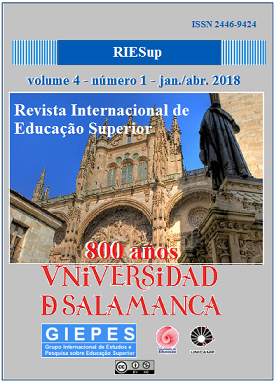Abstract
Current debates have emphasized the change in student behavior in relation to their learning process. It is observed that the current student has the need for information in a short space of time, and often disperses easily in contexts of exclusively traditional and expository classes. Considering this aspect, the present work aims to report the experience with the use of gamification in the 4th and 7th semesters of the compulsory curriculum and in an optional course group of the undergraduate course in Physiotherapy, thus participating 90 students , in an attempt to bring the student closer to the content, motivate the learning and make the classroom environment closer and more attractive to the student. At the end of the classes, questionnaires were applied so that the student could evaluate the experience. The students' evaluation was related to reports of greater motivation, and the awakening of the interest for a greater deepening of the content.
References
AHMED, Maroof et al. Gamification in medical education. Medical Education, n.20, p.1-2, 2015. Disponível em: < https://www.ncbi.nlm.nih.gov/pmc/articles/PMC4590351/> Acesso em: 27 out 2017.
ARAUJO, Eliana Silva Cassimiro; VIEIRA, Vânia Maria Oliveira. Práticas docentes na Saúde: contribuições para uma reflexão a partir de Carl Rogers. Psicologia Escolar e Educacional, n.17, v.1, p. 97-104, 2013. Disponível em: < http://www.redalyc.org/articulo.oa?id=282328025010 >. Acesso em: 27 out 2017
BANFIELD, James; WILKERSON, Brad. Increasing student intrinsic motivation and self-efficacy through gamification pedagogy. Contemporary Issues In Education Research, v. 7, n. 4, p. 291-298, 2014. Disponível em: < https://www.cluteinstitute.com/ojs/index.php/
CIER/article/view/8843/8809 > . Acesso em: 27 out 2017.
FARDO, Luis Marcelo. A gamificação aplicada em ambientes de aprendizagem. Revista Novas Tecnologias em Educação, Porto Alegre, v. 11, n. 1, p.1-9, 2013. Disponível em: < http://www.seer.ufrgs.br/renote/article/view/41629>. Acesso em: 25 out 2017
FRESENIUS, Michael et al. Fisioterapia em traumatologia/cirurgia. São Paulo: Editora Santos, 2007.
HAMARI J.; KOIVISTO J.; SARSA H. Does gamification work?: a literature review of empirical studies on gamification. In: HAWAII INTERNATIONAL CONFERENCE ON SYSTEM SCIENCES, 47th, 2014, Haikoloa, HI. [Proceedings of…]. New York: IEEE, 2014. p. 3025–34.
HANUS, Michael; FOX, Jesse. Assessing the effects of gamification in the classroom: A longitudinal study on intrinsic motivation, social comparison, satisfaction, effort, and academic performance. Computers & Education, v. 80, p. 152-161, 2015. Disponível em: < http://www.sciencedirect.com/science/article/pii/S0360131514002000 >. Acesso em 25 out 2017.
KANTHAN, G. Strengthening student engagement in the classroom. Singapore: National University of Singapore, 2011.
MARTÍ-PARREÑO, José; SEGUÍ-MAS, Diana; SEGUÍ-MAS, Elies. Teachers’ attitude towards and actual use of gamification. Procedia - Social and Behavioral Sciences, v.228, p.682–688, 2016. Disponível em: < http://www.sciencedirect.com/science/article/pii/
S1877042816310308 >. Acesso em: 27 out 2017.
MITRE, Sandra Minardi et al. Metodologias ativas de ensino-aprendizagem na formação profissional em saúde: debates atuais. Ciência & Saúde Coletiva, São Paulo, v. 13, suppl. 2, p. 2133-2144, 2008. Disponível em: < http://www.scielosp.org/scielo.php?pid=S1413-81232008000900018&script=sci_abstract&tlng=es >. Acesso em: 25 out 2017.
PIRKER, Johanna; GÜTL, Christian. Educational gamified science simulations. In: REINERS, Torsten; WOOD, Lincoln (Ed.). Gamification in Education and Business. [New York]: Springer International Publishing, 2015. p. 253- 275.
ROGERS, Carl. Liberdade de aprender. 2.ed. Porto Alegre: Artes Médicas, 1986
SEIXAS, Luma da Rocha; GOMES, Alex Sandro; MELO FILHO, Ivanildo Jose de. Effectiveness of gamification in the engagement of students. Computers in Human Behavior, v.58, p. 48-63, May 2016. Disponível em: < http://www.sciencedirect.com/science/article/pii/S0747563215302363 > Acesso em 25 out 2017.
A Revista Internacional de Educação Superior utiliza a licença do Creative Commons (CC), preservando assim, a integridade dos artigos em ambiente de acesso aberto.


